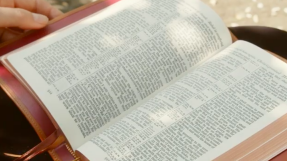Church schools must maintain Christian ethos
Launched today at Lambeth Palace, The Church School of the Future report says that the challenge facing all Church schools is to maintain their distinctive character in an increasingly fragmented education system and increasingly secular society.
“Church schools must be responsive to parents and the communities they serve while celebrating their distinctive Christian ethos,” the report states.
“More than ever, as economic pressures drive a utilitarian approach to education, children in Church schools should experience Christianity as part of their moral and spiritual development, reflected throughout the curriculum.
“We believe that the opportunities afforded by such significant changes should be grasped confidently.”
The report is based on evidence from clergy, school leaders, politicians and other stakeholders in education.
Admissions arrangements “continue to be “contentious”, the report states, with “renewed attacks on the principle of foundation places from parties hostile to Church schools”.
“Church schools continue to be popular with parents and to have good reputations and high standards.
“Nevertheless, there continues to be a concerted attack on the core elements of the Church school identity.
“Most of the challenges and claims made are without foundation or are matters of principle on which disagreement is always possible.”
Church schools are told, however, that the changes and challenges ahead “must not dilute or compromise” the distinctive brand of schools that the Church of England has successfully developed.
“Distinctiveness is about more than organisational arrangements and designation as a school of religious character.
“It must include a wholehearted commitment to putting faith and spiritual development at the heart of the curriculum and ensuring that a Christian ethos permeates the whole educational experience.”
The report goes on to criticise the Government’s decision to leave religious education out of the new English Baccalaureate.
It warns that the exclusion of any consideration of the subject from the current revision of the national curriculum “is likely to have a damaging effect on the status of the subject despite the retention of the statutory requirement”.
“The teaching of religious education is subject to multiple challenges across the school system that the Government seems to have no will to address,” the report states.
“While the Church of England has received some encouragement to work together with other
partners to address some of the issues related to religious education, the responses of the
Government to these concerns have been disappointing.
“Realistically, the Church is limited in its ability to influence practice in the classroom even in its own schools. It does, however, have a voice and will continue to press for recognition of the damage being done to religious education.”
It adds: “High quality religious education and collective worship should continue to make major contributions to the Church school’s Christian ethos.”
A new strategy is recommended to improve the teaching and learning of religious education.
The report points to additional challenges presented by the “serious” reduction in education funding that has had a “substantial effect” on the ability of local authorities to support schools.
“A number of local authorities were already struggling and many others have been forced to reappraise their programmes to see what they can afford,” it says.
“As this process continues and with lower allocations being predicted for future years, even those schools that do not choose to convert to academies will find their support seriously reduced and be forced to look at whether the local authority is providing value for money.”
Those interviewed for the review were also said to have conveyed their “strong feeling” that the wider Church “does not place a high enough value on its schools and the teams that support them”.
The Church of England is the single largest provider of schools in England, with responsibility for more than 4,800 across the country.
It has formed more than a hundred new schools and academies in the last decade alone, with 54,000 more students now receiving secondary education in a Church of England establishment than in 2001.
“This position is one of strength and should be built upon through the current academy development process,” the report states.
The Bishop of Oxford, the Rt Rev John Pritchard, who leads on education for the Church of England, said: “Our schools are a gift to the nation. They have been serving communities for more than 200 years and our schools are very popular with parents. But the report is clear that we must be careful to protect their distinctive nature, especially amid pressure from groups who would prefer that we were not involved in education at all.
“The entire educational landscape has shifted with many more types of school and different providers involved in a new market place. This is an opportunity and I would not be surprised to see at least 200 more Church schools developed in the next five years.”
The Archbishop of Canterbury, Dr Rowan Williams said: "This report marks the exceptional record of our Church schools in the last 200 years and charts the way forward in a fast-changing landscape.
“It is important for the nation that we retain their distinctive character and we are working closely with Government to ensure they continue to thrive."













